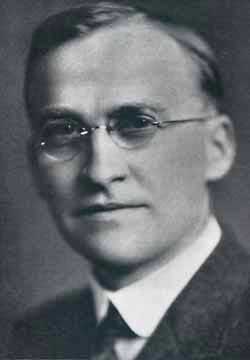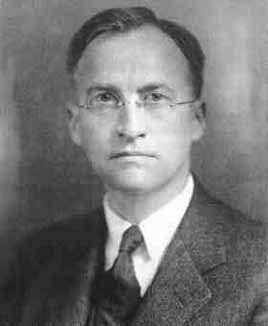<Back to Index>
- Mathematician George David Birkhoff, 1884
- Composer Modest Petrovich Mussorgsky, 1839
- President of Bolivia Hernán Siles Zuazo, 1914
PAGE SPONSOR


George David Birkhoff (21 March 1884, Overisel, Michigan – 12 November 1944, Cambridge, Massachusetts) was an American mathematician, best known for what is now called the ergodic theorem. Birkhoff was one of the most important leaders in American mathematics in his generation, and during his prime he was considered by many to be the preeminent American mathematician. The mathematician Garrett Birkhoff (1911 – 1996) was his son.
Birkhoff obtained his A.B. and A.M. from Harvard. He completed his Ph.D. in 1907, on differential equations, at the University of Chicago. While Eliakim Hastings Moore was his supervisor, he was most influenced by the writings of Henri Poincaré. After teaching at the University of Wisconsin and Princeton University, he taught at Harvard University from 1912 until his death. In 1923, he was awarded the inaugural Bôcher Memorial Prize by the American Mathematical Society for his 1917 paper containing, among other things, what is now called the Birkhoff curve shortening flow. He was elected to the National Academy of Sciences, the American Philosophical Society, the American Academy of Arts and Sciences, the Académie des Sciences in Paris, the Pontifical Academy, and the London and Edinburgh Mathematical Societies. In 1912, attempting to solve the four color problem, Birkhoff introduced the chromatic polynomial. Even though this line of attack did not prove fruitful, the polynomial itself became an important object of study in algebraic graph theory. In 1913, he proved Poincaré's "Last Geometric Theorem," a special case of the three-body problem, a result that made him world famous. In 1927, he published his Dynamical Systems. He wrote on the foundations of relativity and quantum mechanics, publishing (with R E Langer) the monograph Relativity and Modern Physics in 1923. In 1923, Birkhoff also proved that the Schwarzschild geometry is the unique spherically symmetric solution of the Einstein field equations. A consequence is that black holes are not merely a mathematical curiosity, but could result from any spherical star having sufficient mass. Birkhoff's most durable result has been his 1931 discovery of what is now called the ergodic theorem. Combining insights from physics on the ergodic hypothesis with measure theory, this theorem solved, at least in principle, a fundamental problem of statistical mechanics. The ergodic theorem has also had repercussions for dynamics, probability theory, group theory, and functional analysis. He also worked on number theory, the Riemann–Hilbert problem, and the four colour problem. He proposed an axiomatization of Euclidian geometry different from Hilbert's; this work culminated in his text Basic Geometry (1941). In his later years, Birkhoff published two curious speculative works. His 1933 Aesthetic Measure proposed a mathematical theory of aesthetics. While writing this book, he spent a year studying the art, music and poetry of various cultures around the world. His 1938 Electricity as a Fluid combined
his ideas on philosophy and science. His 1943 theory of gravitation is
also puzzling, since Birkhoff knew (but didn't seem to mind) that his
theory allows as sources only matter which is a perfect fluid in which the speed of sound must equal the speed of light (which, needless to say, is quite inconsistent with experiment!).
Albert Einstein and Norbert Wiener, among others, accused Birkhoff of advocating anti-Semitic hiring
practices. During the 1930s, when many Jewish mathematicians fled
Europe and tried to obtain jobs in the USA, Birkhoff is alleged to have
influenced the hiring process at American institutions to exclude Jews.
While Birkhoff may have held anti-Semitic views, it was also the case
that he had always been outspoken in his promotion of American
mathematics and mathematicians. It has been argued that Birkhoff's
actions were in good part motivated by a desire to assure jobs for
home-grown American mathematicians. Saunders Mac Lane (1994),
a close friend and collaborator of Birkhoff's son, argued that any
anti-Semitic tendencies Birkhoff may have had were not unusual for his
time.